Display messages
General notes
 WARNING
WARNING
All categories of messages contain important information which should be taken
note of and,
where a malfunction is indicated, addressed as soon as possible at an authorized
Mercedes-Benz
Center.
Failure to repair the condition noted may cause damage not covered by the Mercedes-Benz Limited Warranty, or result in property damage or personal injury.
Display messages appear in the multifunction display.
Display messages with graphic displays may be shown in simplified form in the Operator's Manual and may differ from the messages shown in the multifunction display.
Please respond in accordance with the display messages and follow the additional notes in this Operator's Manual.
Certain display messages are accompanied by an audible warning tone or a continuous tone.
When you stop and park the vehicle, please observe the notes on the HOLD function (Y page 179) and parking.
Hiding display messages
You can hide some display messages with a low priority.
You can hide some display messages with a low priority.
– Press the  or
or
 button on the steering wheel to
button on the steering wheel to
hide the display message.
The display message is cleared.
Display messages with a high priority are shown in red.
You cannot hide display messages of the highest priority. The multifunction display shows these messages continuously until the causes for the messages have been remedied.
Message memory
The on-board computer saves certain display messages. You can call up the display messages in the message memory.
– Press the  or
or
 button on the steering wheel to
button on the steering wheel to
select the Serv. menu.
If there are display messages, the multifunction display shows, for example, 2 Messages.
– Press the  or
or
 button to select the entry, e.g. 2
button to select the entry, e.g. 2
Messages.
– Confirm witha.
– Press the  or
or
 button to scroll through the
button to scroll through the
display messages.
When the ignition is switched off, all display messages are deleted apart from some highpriority display messages. Once the causes of the high-priority display messages have been rectified, the corresponding display messages are also deleted.
Safety systems
| Display messages | Possible causes/consequences and
 Solutions Solutions |
 |
 Risk of accident Risk of accidentABS (Anti-lock Braking System), ESP®
BAS PLUS and PRE-SAFE® Brake may also have failed.
In addition, the The self-diagnosis function might not be complete, for example. ATTENTION ASSIST is deactivated. The brake system continues to function normally, but without the functions listed above. The wheels could therefore lock if you brake hard, for example. – Carefully drive a suitable distance making slight steering movements at a speed above 12 mph (20 km/h). If the display message disappears, the functions mentioned above are available again. If the display message continues to be displayed: – Drive on carefully. – Visit a qualified specialist workshop. |
 Risk of accident Risk of accidentABS, ESP®, BAS, PRE-SAFE®, the HOLD
BAS PLUS and PRE-SAFE® Brake may also have failed.
In addition, the For example, the on-board voltage may be insufficient. ATTENTION ASSIST is deactivated. The brake system continues to function normally, but without the functions listed above. The wheels could therefore lock if you brake hard, for example. – Drive on carefully. If the display message disappears, the functions mentioned above are available again. If the display message continues to be displayed: – Drive on carefully. – Visit a qualified specialist workshop. |
|
 |
 Risk of accident Risk of accidentABS, ESP®, BAS, PRE-SAFE®, the HOLD
BAS PLUS and PRE-SAFE® Brake may also have failed.
The The brake system continues to function normally, but without the functions listed above. The wheels could therefore lock if you brake hard, for example. ATTENTION ASSIST is deactivated. – Drive on carefully. – Visit a qualified specialist workshop immediately. |
 |
 Risk of accident Risk of accidentESP®, BAS, PRE-SAFE®, the HOLD function,
BAS PLUS and PRE-SAFE® Brake may also have failed.
In addition, the The self-diagnosis function might not be complete, for example. ATTENTION ASSIST is deactivated. The brake system continues to function normally, but without the functions listed above. – Carefully drive a suitable distance making slight steering movements at a speed above 12 mph (20 km/h). If the display message disappears, the functions mentioned above are available again. If the display message continues to be displayed: – Drive on carefully. – Visit a qualified specialist workshop. |
 |
 Risk of accident Risk of accidentESP®, BAS, PRE-SAFE®, the HOLD function,
BAS PLUS and PRE-SAFE® Brake may also have failed.
In addition, the ATTENTION ASSIST is deactivated. The brake system continues to function normally, but without the functions listed above. – Drive on carefully. – Visit a qualified specialist workshop. |
 |
 Risk of accident Risk of accidentEBD (electronic brake force distribution),
BAS PLUS and PRE-SAFE® Brake may also have failed.
In addition, the ATTENTION ASSIST is deactivated. The brake system continues to function normally, but without the functions listed above. The wheels could therefore lock if you brake hard, for example. – Drive on carefully. – Visit a qualified specialist workshop immediately. |
 |
The brake pads/linings have reached their wear limit. – Visit a qualified specialist workshop. |
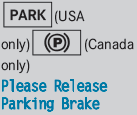 |
The red  (USA only)/ (USA only)/
 (Canada only) indicator (Canada only) indicator
lamp flashes and a warning tone sounds. A condition for automatic release of the electric parking brake is not fulfilled. You are driving with the electric parking brake applied. – Release the electric parking brake manually. |
The red  (USA only)/ (USA only)/
 (Canada only) indicator (Canada only) indicator
lamp flashes and a warning tone sounds. You are making an emergency stop using the electric parking brake. |
|
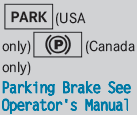 |
The yellow  warning warning
lamp lights up. The electric parking brake is malfunctioning.
To apply: – Press the electric parking brake handle for at least 10 seconds. – Shift the transmission to P. – Consult a qualified specialist workshop. |
The yellow  warning warning
lamp and the red  (USA (USA
only)/  (Canada only) (Canada only)
indicator lamp light up. The electric parking brake is malfunctioning.
To release: – Release the electric parking brake manually.
or
If the yellow – Consult a qualified specialist workshop. |
|
The red  (USA only)/ (USA only)/
 (Canada only) indicator (Canada only) indicator
lamp flashes and the yellow 
warning lamp lights up. The electric parking brake is malfunctioning.
To release: – Release the electric parking brake manually.
To apply: – Apply the electric parking brake manually.
If the red – Secure the vehicle against rolling away. – Shift the transmission to P. – Turn the front wheels towards the curb. – Consult a qualified specialist workshop. |
|
The yellow  warning warning
lamp lights up. The red 
(USA only)/  (Canada only) (Canada only)
indicator lamp flashes for approximately 10 seconds after the electric parking brake has been applied or released. It then goes out or remains lit. The electric parking brake is malfunctioning. – Switch off the ignition and turn it back on. – Engage the electric parking brake. If it is not possible to engage the electric parking brake: – Shift the transmission to P. – Visit a qualified specialist workshop. If it is not possible to release the electric parking brake: – Release the electric parking brake automatically. If the electric parking brake still cannot be released: – Consult a qualified specialist workshop. |
|
The yellow  warning warning
lamp lights up. When you release or apply the electric parking brake manually, the red  (USA (USA
only)/  (Canada only) (Canada only)
indicator lamp flashes. The electric parking brake is malfunctioning. It is not possible to apply the electric parking brake manually. – Shift the transmission to P. – Visit a qualified specialist workshop. |
|
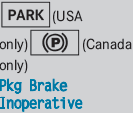 |
The yellow  warning warning
lamp lights up. The red 
(USA only)/  (Canada only) (Canada only)
indicator lamp flashes for approximately 10 seconds after the electric parking brake has been applied or released. It then goes out or remains lit. The electric parking brake is malfunctioning, e.g. because of overvoltage or undervoltage. – Remove the cause for the overvoltage or undervoltage, e.g. by charging the battery or restarting the engine. – Engage or release the electric parking brake.
If it remains impossible to apply or release the electric parking
brake: – Engage or release the electric parking brake. If the electric parking brake still cannot be released: – Consult a qualified specialist workshop. |
| The display message is only shown while the vehicle is in motion.
The yellow It is not possible to apply the electric parking brake manually. – Shift the transmission to P. – Visit a qualified specialist workshop. |
|
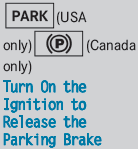 |
The red  (USA only)/ (USA only)/
 (Canada only) indicator (Canada only) indicator
lamp lights up. You attempted to release the electric parking brake while the ignition was switched off. – SmartKey: turn the SmartKey to position 1 in the ignition lock. – KEYLESS-GO: switch on the ignition. |
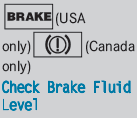 |
 Risk of accident Risk of accidentThere is not enough brake fluid in the
Additionally, the red – Pull over and stop the vehicle safely as soon as possible, paying attention to road and traffic conditions. Do not continue driving under any circumstances. – Engage the electric parking brake. – Consult a qualified specialist workshop. – Do not add brake fluid. This will not rectify the malfunction. |
 WARNING
WARNING
Driving with the message Check Brake Fluid Level displayed can result in an
accident. Have
your brake system checked immediately.
Do not add brake fluid before checking the brake system. Overfilling the brake fluid reservoir can result in spilling brake fluid on hot engine parts and the brake fluid catching fire. You can be seriously burned.
| Display messages | Possible causes/consequences and
 Solutions Solutions |
 |
USA only: one or more of the main functions in the mbrace system are
malfunctioning. Canada only: one or more of the main functions of the TELEAID system are malfunctioning. – USA only: have the mbrace system checked at a qualified specialist workshop. – Canada only: have the TELEAID system checked at a qualified specialist workshop. |
 |
 Risk of injury Risk of injuryImportant functions of PRE-SAFE® have
– Visit a qualified specialist workshop immediately. |
 |
 Risk of accident Risk of accidentPRE-SAFE® Brake is temporarily inoperative
- the sensors in the bumpers are dirty. - its function is impaired due to heavy rain or snow. - the radar sensor system is temporarily inoperative, e.g. due to electromagnetic radiation emitted by nearby TV or radio stations or other sources of electromagnetic radiation. - the system is outside the operating temperature range. - the on-board voltage is too low.
PRE-SAFE® Brake is operational again and the display message disappears
if: - the system detects that the sensors are fully available again. - the system is within the operating temperature range. If the display message continues to be displayed: – Clean the DISTRONIC PLUS cover in the radiator grill. – Clean the bumpers. – Restart the engine. – Wait until the battery is sufficiently charged. |
 |
 Risk of accident Risk of accidentPRE-SAFE® Brake is defective. BAS PLUS or
– Visit a qualified specialist workshop. |
 |
 Risk of injury Risk of injuryThere is a malfunction in the SRS
– Visit a qualified specialist workshop. |
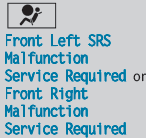 |
 Risk of injury Risk of injurySRS has malfunctioned at the front on the
– Visit a qualified specialist workshop. |
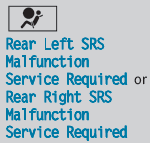 |
 Risk of injury Risk of injurySRS has malfunctioned at the rear on the
– Visit a qualified specialist workshop. |
 |
 Risk of injury Risk of injurySRS has malfunctioned at the rear center.
– Visit a qualified specialist workshop. |
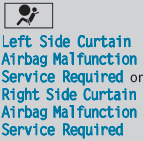 |
 Risk of injury Risk of injuryThere is a malfunction in the left-hand
– Visit a qualified specialist workshop. |
 WARNING
WARNING
In the event a malfunction of the SRS is indicated as outlined above, the SRS
may not be
operational.
For your safety, we strongly recommend that you contact an authorized Mercedes-Benz Center immediately to have the system checked. Otherwise the SRS may not be activated when needed in an accident, which could result in serious or fatal injury, or it might deploy unexpectedly and unnecessarily which could also result in injury.
| Display messages | Possible causes/consequences and
 Solutions Solutions |
 |
The front-passenger air bag is enabled during the journey, even
though: - a child, a small adult or an object weighing less than the system's weight threshold is located on the front-passenger seat. - the front-passenger seat is unoccupied. The system may detect objects or forces applying additional weight on the seat. – Pull over and stop the vehicle safely as soon as possible, paying attention to road and traffic conditions. – Engage the parking brake. – Switch off the ignition. – Open the front-passenger door. – Remove the child and the child restraint system from the frontpassenger seat. – If necessary, secure the child in a child restraint system on a suitable rear seat. – Make sure that there are no objects on the seat adding to the weight. The system may otherwise detect the additional weight and interpret the seat occupant's weight as greater than it actually is. – Keep the seat unoccupied, close the front-passenger door and switch on the ignition.
Observe the - the Front Passenger Airbag Enabled See Operator's Manual or Front Passenger Airbag Disabl'd See Operator's Manual display messages must not appear in the multifunction display. Wait for a period of at least 60 seconds until the necessary system checks have been completed and to make sure that the display messages do not appear in the multifunction display.
If these conditions are fulfilled, the front-passenger seat can be
occupied again. Whether the If the conditions are not fulfilled, the system is not operating correctly. – Visit a qualified specialist workshop immediately. |
 WARNING
WARNING
If the
 indicator lamp
indicator lamp
remains off even after performing the above corrective steps, do
not have any children 12 years old and under and other small individuals use the
front-passenger
seat until the system has been repaired.
| Display messages | Possible causes/consequences and
 Solutions Solutions |
 |
The front-passenger air bag is deactivated during the journey even
though an adult or a person larger than a certain size is occupying the
front-passenger seat. If additional forces are applied to the seat, the
system may interpret the occupant's weight as lower than it actually
is. – Pull over and stop the vehicle safely as soon as possible, paying attention to road and traffic conditions. – Engage the parking brake. – Switch off the ignition. – Have the occupant get out of the vehicle. – Keep the seat unoccupied, close the front-passenger door and switch on the ignition.
Observe the - the Front Passenger Airbag Enabled See Operator's Manual or Front Passenger Airbag Disabled See Operator's Manual display messages must not appear in the multifunction display. Wait for a period of at least 60 seconds until the necessary system checks have been completed and to make sure that the display messages do not appear in the multifunction display.
If these conditions are fulfilled, the front-passenger seat can be
occupied again. Whether the If the conditions are not fulfilled, the system is not operating correctly. – Visit a qualified specialist workshop immediately. |
 WARNING
WARNING
If the
 indicator lamp
indicator lamp
remains lit with an adult occupant on the front-passenger seat
even after performing the above corrective steps, do not have any passenger use
the frontpassenger
seat until the system has been repaired.
Lights

Display messages about LEDs:
This display message will only appear if all LEDs have failed.
| Display messages | Possible causes/consequences and
 Solutions Solutions |
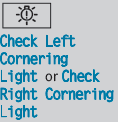 |
The left or right-hand cornering light is defective. – Check whether you are permitted to change the bulb yourself.
or |
 |
The left or right-hand low-beam headlamp is defective. – Check whether you are permitted to change the bulb yourself.
or |
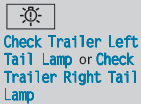 |
The left or right-hand trailer tail lamp is faulty. – Check whether you are permitted to change the bulb yourself.
or |
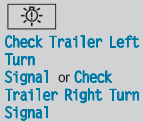 |
The left or right-hand trailer turn signal lamp is defective. – Check whether you are permitted to change the bulb yourself.
or |
 |
The trailer brake lamp is defective. – Check whether you are permitted to change the bulb yourself.
or |
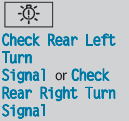 |
The rear left-hand or rear right-hand turn signal is defective. – Check whether you are permitted to change the bulb yourself.
or |
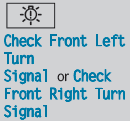 |
The front left-hand or front right-hand turn signal is defective. – Check whether you are permitted to change the bulb yourself.
or |
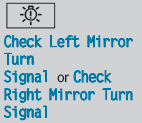 |
The turn signal in the left-hand or right-hand exterior mirror is
defective. – Check whether you are permitted to change the bulb yourself.
or |
 |
The high-mounted brake lamp is faulty. – Check whether you are permitted to change the bulb yourself.
or |
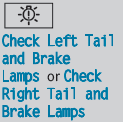 |
The left or right-hand brake lamp is defective. – Check whether you are permitted to change the bulb yourself.
or |
 |
The left or right-hand high beam is defective. – Check whether you are permitted to change the bulb yourself.
or |
 |
The license plate lamps are faulty. – Check whether you are permitted to change the bulb yourself.
or |
 |
The rear fog lamp is defective. – Check whether you are permitted to change the bulb yourself.
or |
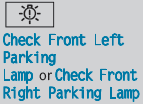 |
The front left or front right parking or standing lamp is
defective. – Check whether you are permitted to change the bulb yourself.
or |
 |
The backup lamp is defective. – Check whether you are permitted to change the bulb yourself.
or |
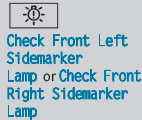 |
The left or right front side marker lamp is defective. – Check whether you are permitted to change the bulb yourself.
or |
 |
The left or right-hand tail lamp is defective.
or – Check whether you are permitted to change the bulb yourself.
or |
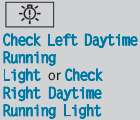 |
The left or right-hand daytime running lamp is defective. – Check whether you are permitted to change the bulb yourself.
or |
 |
The active light function is defective. – Visit a qualified specialist workshop. |
 |
The exterior lighting is defective. – Visit a qualified specialist workshop. |
 |
The light sensor is defective. – Visit a qualified specialist workshop. |
 |
The lights are still switched on when you leave the vehicle. A
warning tone also sounds.
– Turn the light switch to |
 |
Adaptive Highbeam Assist is faulty. – Visit a qualified specialist workshop. |
 |
Adaptive Highbeam Assist is deactivated and temporarily inoperative.
Possible causes are: - the windshield in the camera's field of vision is dirty. - visibility is impaired due to heavy rain, snow or fog. – Clean the windshield. If the system detects that the camera is fully functional again, the Adaptive Highbeam Assist Now Available display message is shown. Adaptive Highbeam Assist is operational again. |
Engine
| Display messages | Possible causes/consequences and
 Solutions Solutions |
 |
The coolant level is too low. – Add coolant, observing the warning notes when doing so. – If coolant needs to be added more often than usual, have the engine coolant system checked at a qualified specialist workshop. |
 WARNING
WARNING
Do not spill antifreeze on hot engine parts. Antifreeze contains ethylene glycol
which may burn
if it comes into contact with hot engine parts. You could be seriously burned.

The coolant level is too low. Avoid making long journeys with too little coolant
in the cooling
system. The engine will otherwise be damaged.
The display messages and the corresponding symbol that indicate that the coolant level is too low must not be ignored.
| Display messages | Possible causes/consequences and
 Solutions Solutions |
 |
The coolant is too hot. – Pull over and stop the vehicle safely and switch off the engine, paying attention to road and traffic conditions. – Make sure that the air supply to the engine radiator is not blocked, e.g. by snow, slush or ice. – Wait until the display message disappears before restarting the engine. Otherwise, there is a risk of engine damage. – Pay attention to the coolant temperature display. – If the temperature increases again, visit a qualified specialist workshop immediately. |
| The poly-V-belt may have torn. – Pull over and stop the vehicle safely and switch off the engine, paying attention to road and traffic conditions. – Open the hood. – Check whether the poly-V-belt is torn. If the poly-V-belt is torn:
– Consult a qualified specialist workshop. If the poly-V-belt is not damaged: – Wait until the display message disappears before restarting the engine. Otherwise, there is a risk of engine damage. – Pay attention to the coolant temperature display. – Visit a qualified specialist workshop. |
 WARNING
WARNING
Driving when your engine is overheated can cause some fluids which may have
leaked into the
engine compartment to catch fire. You could be seriously burned.
Steam from an overheated engine can cause serious burns which can occur just by opening the engine hood. Stay away from the engine if you see or hear steam coming from it.
Stop the vehicle in a safe location away from other traffic. Turn off the engine, get out of the vehicle and do not stand near the vehicle until the engine has cooled down.

If the coolant temperature exceeds 248 °F(120 °C) do not continue driving. The
engine will
otherwise be damaged.
| Display messages | Possible causes/consequences and
 Solutions Solutions |
 |
The engine fan is defective. – At coolant temperatures under 248 °F (120 °C ), drive to the next qualified specialist workshop. – Avoid subjecting the engine to heavy loads, e.g. driving in mountainous terrain, and stop-and-go traffic. |
 |
The battery is not being charged.
Possible causes are: – Open the hood. – Check whether the poly-V-belt is torn. If the poly-V-belt is torn:
– Consult a qualified specialist workshop. If the poly-V-belt is not damaged: – Visit a qualified specialist workshop. |
 |
The engine oil level has dropped to the minimum level. A warning tone also sounds. – Check the engine oil level at the latest when next refueling. – If necessary, add engine oil. – If engine oil needs to be added more often than usual, have the engine checked at a qualified specialist workshop. |
Information on approved engine oils can be obtained from any qualified specialist workshop or on the Internet at http://www.mbusa.com (USA only).

The oil level is too low. Avoid long journeys with too little engine oil. There
is a risk of
engine damage.
The display messages and the corresponding symbol that indicate that the oil level is too low must not be ignored.
| Display messages | Possible causes/consequences and
 Solutions Solutions |
 |
The fuel level has dropped into the reserve range. – Refuel at the nearest gas station. |
 |
There is only a very small amount of fuel in the fuel tank. – Refuel at the nearest gas station without fail. |
 |
The fuel system pressure is too low. The fuel filler cap is not
closed correctly or the fuel system is leaking. – Check that the fuel filler cap is correctly closed. If the fuel filler cap is not correctly closed: – Close the fuel filler cap. If the fuel filler cap is correctly closed: – Visit a qualified specialist workshop. |
 |
Vehicles with a diesel engine: the fuel level has fallen below the
reserve range. – Refuel at the nearest gas station. – Only use commercially available vehicular ULTRA-LOW SULFUR HIGHWAY DIESEL FUEL (ULSD, 15 ppm SULFUR MAXIMUM). |
 |
Vehicles with a diesel engine: the engine air filter is dirty and
must be replaced. – Visit a qualified specialist workshop. |
 |
Vehicles with a diesel engine: there is water in the fuel filter.
The water must be drained off. – Visit a qualified specialist workshop. |
 |
The DEF tank is empty. – Have the DEF tank filled as soon as possible at a qualified specialist workshop. |
 |
The DEF level has fallen to a minimum. – Have the DEF tank filled immediately at a qualified specialist workshop. |
Driving systems
| Display messages | Possible causes/consequences and
 Solutions Solutions |
 |
Based on specific criteria, ATTENTION ASSIST has determined that the
driver is tired or paying less attention. A warning tone also sounds. – If necessary, take a break. During long journeys, take regular breaks in good time so you get enough rest. |
 |
ATTENTION ASSIST has failed. – Visit a qualified specialist workshop. |
 |
You cannot change the vehicle level. Possible causes are:
- you are driving too fast for the selected vehicle level. - you are towing a trailer. - the trailer-coupling socket is being used, e.g. for a bicycle rack. – Drive more slowly and then select the desired vehicle level again. – Observe the notes on towing a trailer. |
 |
You have selected a higher vehicle level. The compressor first needs
to cool down because of frequent level changes. – Drive in a manner appropriate for the current vehicle level. – Make sure that there is sufficient ground clearance. – Allow the compressor to cool down. When the compressor has cooled down, the display message disappears. The vehicle then continues rising to the selected level. |
 |
AIRMATIC is malfunctioning. – Drive in a manner appropriate for the current vehicle level, but no faster than 50 mph (80 km/h). – Make sure that there is sufficient ground clearance. – Have the vehicle checked at a qualified specialist workshop. |
| The Active Curve System is faulty. The vehicle's handling
characteristics may be affected. – Do not drive faster than 50 mph (80 km/h). – Have the vehicle checked at a qualified specialist workshop. |
|
 |
 Risk of accident Risk of accidentThe Active Curve System is faulty. The
In addition, the vehicle level display appears between the vehicle icon and the display message, and a warning tone sounds. – Do not drive faster than 12 mph (20 km/h). – Adjust your driving style to the altered handling characteristics. – Visit a qualified specialist workshop immediately. |
 |
DSR (Downhill Speed Regulation) is deactivated due to a
malfunction. – Have DSR checked at a qualified specialist workshop. |
 |
The HOLD function is deactivated. The vehicle is skidding. A warning tone also sounds. – Reactivate the HOLD function later. |
 |
The radar sensor system is deactivated. – Switch on the radar sensor system. |
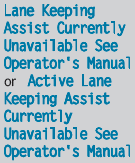 |
Lane Keeping Assist or Active Lane Keeping Assist is deactivated and
temporarily inoperative. Possible causes are:
- the windshield in the camera's field of vision is dirty. - visibility is impaired due to heavy rain, snow or fog. - there are no lane markings for a longer period. - the lane markings are worn, dark or covered, e.g. by dirt or snow. If the display message does not disappear: – Pull over and stop the vehicle safely as soon as possible, paying attention to road and traffic conditions. – Apply the electric parking brake. – Clean the windshield. If the system detects that the camera is fully operational, the display message disappears. Lane Keeping Assist or Active Lane Keeping Assist is operational again. |
 |
Lane Keeping Assist or Active Lane Keeping Assist is defective. – Visit a qualified specialist workshop. |
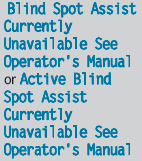 |
Blind Spot Assist or Active Blind Spot Assist is temporarily
inoperative. Possible causes are:
- you have established the electrical connection between the trailer and
your vehicle. - the sensors are dirty. - function is impaired due to heavy rain or snow. - the radar sensor system is outside the operating temperature range. - the radar sensor system is temporarily inoperative, e.g. due to electromagnetic radiation emitted by nearby TV or radio stations or other sources of electromagnetic radiation.
The yellow
– When towing a trailer, confirm the display message with
– Apply the electric parking brake. – Clean the sensors. – Restart the engine. If the system detects that the sensors are fully operational, the display message disappears. Blind Spot Assist or Active Blind Spot Assist is operational again. |
 |
Blind Spot Assist or Active Blind Spot Assist is defective.
The yellow – Visit a qualified specialist workshop. |
 |
The driver's door is open and the driver's seat belt has not been
fastened. – Repeat the parking process with the seat belt fastened and the driver's door closed. |
| You have inadvertently touched the multifunction steering wheel
while steering intervention was active. – While steering intervention is active, make sure that the multifunction steering wheel is not touched unintentionally. |
|
| The vehicle has started to skid and ESP® has intervened. – Use Active Parking Assist again later. |
|
 |
You have just carried out a large number of turning or parking
maneuvers. Active Parking Assist will become available again after approximately 10 minutes. – Pull over and stop the vehicle safely as soon as possible, paying attention to road and traffic conditions. – Switch off and restart the engine. If the display message continues to be displayed: – Visit a qualified specialist workshop. |
| PARKTRONIC is defective. – Visit a qualified specialist workshop. |
|
 |
The vehicle is parked. A warning tone also sounds. The display message disappears automatically. |
 |
DISTRONIC PLUS has been deactivated. If it was deactivated automatically, a warning tone also sounds. |
 |
DISTRONIC PLUS is operational again after having been temporarily unavailable. You can now reactivate DISTRONIC PLUS. |
 |
DISTRONIC is deactivated and temporarily inoperative. Possible
causes are: - the DISTRONIC PLUS cover in the radiator grille is dirty. - function is impaired due to heavy rain or snow. - the sensors in the bumpers are dirty. - the radar sensor system is temporarily inoperative, e.g. due to electromagnetic radiation emitted by nearby TV or radio stations or other sources of electromagnetic radiation. - the system is outside the operating temperature range. - The on-board voltage is too low. A warning tone also sounds. If the display message does not disappear: – Pull over and stop the vehicle safely as soon as possible, paying attention to road and traffic conditions. – Apply the electric parking brake. – Clean the DISTRONIC PLUS cover in the radiator grille. – Clean the bumpers. – Restart the engine. If the system detects that the sensors are fully operational, the display message disappears. DISTRONIC is operational again. |
 |
DISTRONIC PLUS is defective. BAS PLUS (Brake Assist PLUS) and
PRE-SAFE® Brake may be inoperative as well. A warning tone also sounds. – Visit a qualified specialist workshop. |
 |
You have depressed the accelerator pedal. DISTRONIC PLUS is no
longer controlling the speed of the vehicle. – Take your foot off the accelerator pedal. |
 |
An activation condition for DISTRONIC PLUS is not fulfilled. – Check the activation conditions for DISTRONIC PLUS. |
 |
Cruise control is defective. – Visit a qualified specialist workshop. |
 |
A condition for activating cruise control has not been fulfilled. You attempted to save a speed of less than 20 mph (30 km/h). – If the situation allows, drive faster than 20 mph (30 km/h) and save the speed. – Check the activation conditions for cruise control. |
Tires
 WARNING
WARNING
Do not drive with a flat tire. A flat tire affects the ability to steer or brake
the vehicle. You may
lose control of the vehicle. Continued driving with a flat tire will cause
excessive heat build-up
and possibly a fire.
 WARNING
WARNING
Follow recommended tire inflation pressures.
Do not underinflate tires. Underinflated tires wear excessively and/or unevenly, adversely affect handling and fuel economy, and are more likely to fail from being overheated.
Do not overinflate tires. Overinflated tires can adversely affect handling and ride comfort, wear unevenly, increase stopping distance, and result in sudden deflation (blowout) because they are more likely to become punctured or damaged by road debris, potholes etc.
| Display messages | Possible causes/consequences and
 Solutions Solutions |
 |
The tire pressure monitor is measuring the tire pressure. – Drive on. The tire pressures appear in the multifunction display after you have been driving for a few minutes. |
See also:Setting the center air vents Important safety notes Before changing a fuse Categories
© 2025 Copyright www.mersuv.com
|

 ,
,
 and
and
 warning lamps light up in
warning lamps light up in
 (USA only)/
(USA only)/
 (Canada only),
(Canada only),
 warning lamp also lights
warning lamp also lights
 indicator lamp
indicator lamp

 .
. indicator lamps
indicator lamps
 .
.